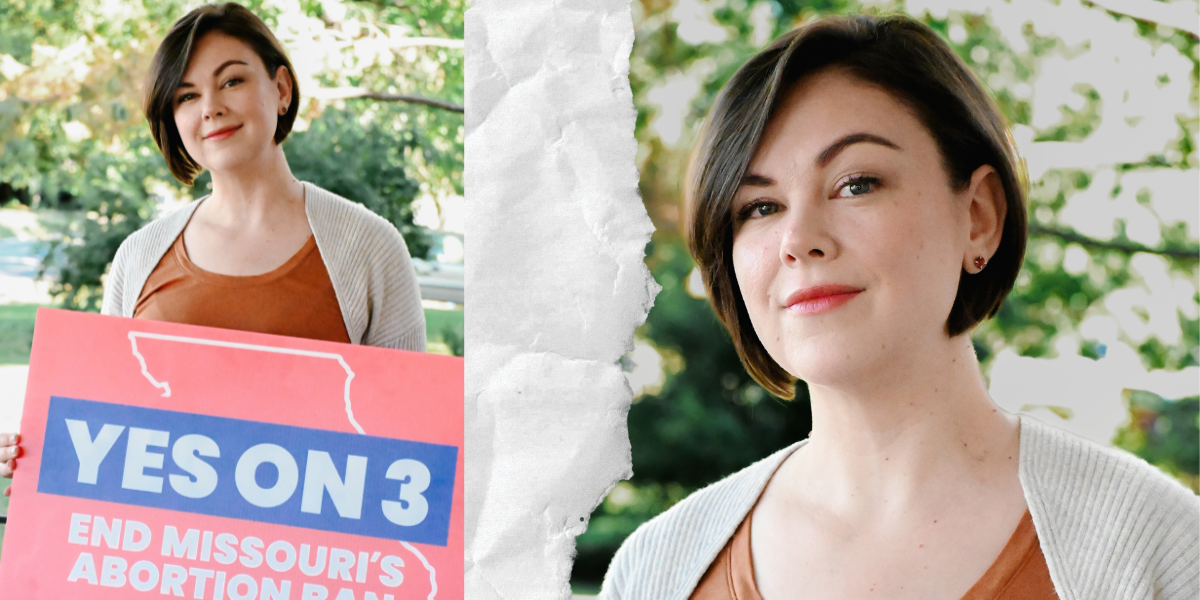Q: Can you start by telling us your name and where you’re from?
“My name is Elise, and I’m from Kansas City, Missouri.”
Q: Why did you want to be part of this today?
“I wanted to tell my story today because I don’t think enough people talk about abortion or about working in abortion care. If we normalize it, I think it can really help create change.”
Q: What inspired you to become a nurse?
“I became a nurse because I love people, and I wanted to do something meaningful to help them in their daily lives.”
Q: What made you choose to work specifically in abortion care?
“I started working as a nurse in abortion care because I’ve always been interested in reproductive health. It’s one of those subjects that can feel taboo to people, but I don’t think it should be. I love having honest conversations with people about sexual health. Also, I had nurses who did that for me, and it was really meaningful—so I wanted to do that for others.”
“When I was growing up, my mother took me and my two sisters to protest at abortion clinics. Now, working in abortion care feels like coming full circle. I don’t believe in what we did back then, and I don’t believe there’s a moral component to abortion. It’s healthcare, plain and simple, and people should have access to it.”
Q: Can you tell us about what you saw while working in abortion care?
“As a nurse at an abortion clinic in Kansas, I saw people traveling from everywhere—Texas, Oklahoma, Arkansas, Louisiana, and all over Missouri. Some drove overnight with children or a baby in the car. They often missed work and pay, all for a healthcare appointment. It should never be like that. It’s just not okay.”
“I’ve said this so many times, but it’s still not fair.”
Q: Is there a particular story that stands out to you?
“There was one client who really sticks with me. She was a 40-year-old woman from Texas who flew into Kansas City for her appointment. She got an Uber to our clinic, but instead, the driver took her to a crisis pregnancy center. These places look like medical clinics, but they’re not—they try to convince people not to get abortions. My client had no idea where she was and was stuck there for hours, feeling like she couldn’t leave. When she finally arrived at our clinic, she had a bag of diapers and a book about raising kids from the 90s that they’d given her. She asked us, ‘Please help me.’ And we did.”
Q: How do you feel about abortion being on the ballot this year?
“When I heard that we could get abortion on the ballot this year, I was so excited. This is something that should have never been taken away from us. Abortion is healthcare, and healthcare is a human right. This year, we have the opportunity to take back what is ours. That’s why I’m voting YES on Amendment 3.”
Q: What are some common misconceptions about abortion?
“My opinion as a healthcare professional is that abortion is valid no matter the reason someone is seeking it. I trust my clients to know what’s best for their bodies, their lives, and their families. I’ve worked with people who already have children and can’t afford another, or who have complicated pregnancies—there are so many reasons, but all of them are valid.”
Q: How have abortion bans affected your job?
“Abortion has always been a safe, effective part of healthcare, and providers used to be able to recommend it when it was needed. Now, many healthcare professionals feel censored—they can’t talk about abortion freely without risking their licenses. As a nurse, I still talk about it, but I know that doctors, nurse practitioners, and physician’s assistants feel the pressure even more. Abortion is healthcare, and we can’t offer full, accurate care if we’re being censored.”
Q: Would you like to make a closing statement?
“As a medical professional, fuck abortion bans. These laws are preventing us from doing our jobs and from helping people get the healthcare they need.”
